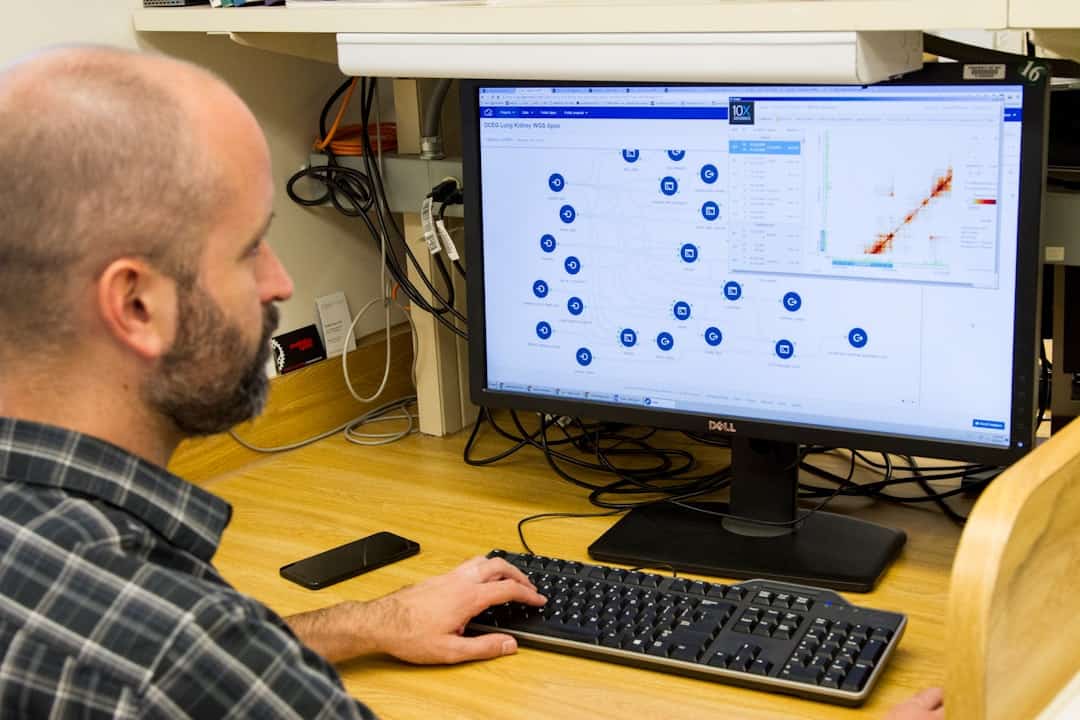In the rapidly evolving landscape of artificial intelligence, Dataiku stands out as a comprehensive platform designed to empower organizations in their data-driven endeavors. Founded in 2013, DatAIku has quickly gained traction among businesses seeking to harness the power of data science and machine learning without requiring extensive technical expertise. The platform offers a user-friendly interface that caters to both data scientists and business analysts, making it an attractive option for companies looking to democratize data access and analytics across their teams.
Dataiku’s versatility is one of its most compelling features. It supports a wide range of data sources, from traditional databases to cloud storage solutions, enabling users to connect and analyze data seamlessly. The platform’s capabilities extend beyond mere data manipulation; it encompasses the entire data science lifecycle, from data preparation and exploration to model deployment and monitoring.
This holistic approach allows organizations to streamline their workflows and maximize the value derived from their data assets.
Key Takeaways
- Dataiku is a comprehensive AI platform that offers a wide range of tools and features for data science, machine learning, and advanced analytics.
- With Dataiku, businesses can harness the power of machine learning to gain valuable insights from their data and make more informed decisions.
- Dataiku helps streamline processes through automation, allowing organizations to save time and resources while improving efficiency.
- Real-time data processing with Dataiku can be a game-changer for businesses, enabling them to make faster, more accurate decisions based on up-to-date information.
- Fostering collaboration with Dataiku is key to success, as it allows teams to work together more effectively and share insights and findings.
Harnessing the Power of Machine Learning with Dataiku
Machine Learning Functionality
At the core of Dataiku’s offering lies its robust machine learning functionality, which empowers users to build, train, and deploy predictive models with ease. The platform provides a rich library of algorithms, ranging from traditional statistical methods to advanced deep learning techniques.
Streamlined Feature Engineering
Dataiku also simplifies the process of feature engineering, a critical step in machine learning that involves selecting and transforming variables to improve model performance. With its intuitive visual interface, users can easily create new features, handle missing values, and perform data transformations without writing complex code.
Encouraging Experimentation and Innovation
This accessibility encourages experimentation and innovation, enabling teams to iterate quickly and refine their models based on real-time feedback.
Streamlining Processes through Automation with Dataiku

One of the standout features of Dataiku is its ability to automate repetitive tasks, significantly enhancing productivity for data teams. By leveraging automation, organizations can reduce the time spent on mundane activities such as data cleaning, preprocessing, and report generation. Dataiku’s automation capabilities allow users to create workflows that can be scheduled to run at specific intervals or triggered by certain events, ensuring that data is always up-to-date and ready for analysis.
Moreover, Dataiku’s automation extends to model deployment and monitoring. Once a predictive model has been developed, it can be seamlessly integrated into production environments with minimal effort. The platform provides tools for monitoring model performance over time, allowing organizations to detect any drift in accuracy and make necessary adjustments proactively.
This level of automation not only saves time but also enhances the reliability of insights derived from machine learning models.
Real-Time Data Processing with Dataiku: A Game-Changer for Businesses
| Benefits of Real-Time Data Processing with Dataiku | Impact on Businesses |
|---|---|
| Improved decision-making | Enhanced agility and competitiveness |
| Increased operational efficiency | Ability to respond to market changes quickly |
| Real-time insights and analytics | Improved customer experience |
| Cost savings through automation | Optimized resource allocation |
In today’s fast-paced business environment, the ability to process data in real-time is crucial for maintaining a competitive edge. Dataiku excels in this area by offering robust capabilities for real-time data ingestion and processing. Organizations can connect to streaming data sources, such as IoT devices or social media feeds, and analyze this information as it arrives.
This capability enables businesses to respond swiftly to emerging trends or anomalies, making informed decisions based on the most current data available. The real-time processing capabilities of Dataiku are particularly beneficial for industries such as finance, retail, and healthcare, where timely insights can significantly impact outcomes. For instance, financial institutions can monitor transactions in real-time to detect fraudulent activities, while retailers can analyze customer behavior on-the-fly to optimize inventory management and enhance customer experiences.
By leveraging Dataiku’s real-time processing features, organizations can transform their operations and drive innovation across various sectors.
Fostering Collaboration with Dataiku: A Key to Success
Collaboration is essential in any data-driven initiative, and Dataiku recognizes this by providing tools that facilitate teamwork among diverse stakeholders. The platform allows multiple users to work on projects simultaneously, enabling data scientists, analysts, and business users to contribute their expertise throughout the data science lifecycle. This collaborative environment fosters knowledge sharing and encourages cross-functional teams to work together towards common goals.
Dataiku also includes features such as version control and project documentation, which help maintain transparency and accountability within teams. Users can track changes made to projects over time, ensuring that everyone is aligned on the latest developments. Additionally, the platform supports the creation of dashboards and visualizations that can be shared across the organization, promoting a culture of data-driven decision-making.
By fostering collaboration through its intuitive interface and robust features, Dataiku empowers organizations to unlock the full potential of their data assets.
Leveraging Dataiku for Advanced Analytics and Insights

Dataiku is not just a tool for building machine learning models; it also serves as a powerful platform for advanced analytics and deriving actionable insights from complex datasets. With its built-in analytics capabilities, users can perform exploratory data analysis (EDA) to uncover patterns and trends that may not be immediately apparent. This process is essential for understanding the underlying factors driving business performance and identifying opportunities for improvement.
The platform’s advanced visualization tools enable users to create compelling reports and dashboards that communicate insights effectively. By transforming raw data into visually appealing representations, organizations can engage stakeholders at all levels and facilitate informed decision-making.
By leveraging Dataiku for advanced analytics, organizations can gain deeper insights into their operations and drive strategic initiatives based on data-driven evidence.
Integrating Dataiku into Your Business Strategy: Best Practices and Tips
Successfully integrating Dataiku into an organization’s business strategy requires careful planning and execution. One of the first steps is to identify key stakeholders who will benefit from the platform’s capabilities. Engaging these stakeholders early in the process ensures that their needs are addressed and fosters buy-in across the organization.
Additionally, providing training sessions for users at different skill levels can help maximize adoption and utilization of the platform. Another best practice is to establish clear governance around data usage within Dataiku. Defining roles and responsibilities for data access, model development, and project management helps maintain accountability and ensures compliance with regulatory requirements.
Organizations should also consider creating a centralized repository for storing models and datasets developed within Dataiku, facilitating knowledge sharing and reuse across teams.
The Future of Dataiku: Innovations and Developments
As we look ahead, Dataiku continues to innovate and expand its offerings in response to the evolving needs of businesses in an increasingly data-centric world. The company is actively investing in enhancing its machine learning capabilities by incorporating cutting-edge technologies such as automated machine learning (AutoML) and explainable AI (XAI). These advancements aim to simplify the model-building process further while ensuring transparency in how models make predictions.
Moreover, Dataiku is exploring integrations with emerging technologies such as edge computing and augmented analytics. By enabling organizations to process data closer to its source and leverage AI-driven insights automatically, these innovations will empower businesses to make faster decisions based on real-time information. As Dataiku continues to evolve, it remains committed to helping organizations unlock the full potential of their data assets while fostering a culture of collaboration and innovation in the field of artificial intelligence.
Wenn Sie sich für die Integration von KI-Plattformen wie Dataiku und deren Anwendung in der Echtzeitdatenverarbeitung und KI-Automatisierung interessieren, könnte der Artikel über die Zusammenarbeit in verschiedenen Industrien innerhalb des Metaversums ebenfalls von Interesse sein. Der Artikel „Business Collaboration in the Metaverse“ beleuchtet, wie Plattformen im Metaversum die Zusammenarbeit über traditionelle Grenzen hinweg ermöglichen und dabei Technologien wie maschinelles Lernen und KI nutzen, um effiziente, immersive und interaktive Umgebungen zu schaffen. Dies könnte relevante Einblicke bieten, wie ähnliche Technologien in anderen digitalen Ökosystemen angewendet werden.
FAQs
What is Dataiku?
Dataiku is a collaborative data science platform that enables businesses to build and deploy their own data products more efficiently. It provides tools for data preparation, machine learning, and deployment, as well as features for collaboration and real-time data processing.
What are the key features of Dataiku?
Dataiku offers a wide range of features including data preparation, machine learning, AI automation, real-time data processing, and collaboration tools. It also provides a visual interface for building and deploying data products, as well as integrations with various data sources and technologies.
What is machine learning in the context of Dataiku?
Machine learning in Dataiku refers to the use of algorithms and statistical models to enable computers to learn from and make predictions or decisions based on data. Dataiku provides a range of machine learning tools and capabilities to help businesses build and deploy machine learning models.
What is AI automation in Dataiku?
AI automation in Dataiku refers to the use of artificial intelligence to automate various tasks and processes related to data science and machine learning. This includes automating feature engineering, model selection, hyperparameter tuning, and deployment of machine learning models.
What is real-time data processing in Dataiku?
Real-time data processing in Dataiku refers to the ability to process and analyze data as it is generated, rather than in batch mode. This enables businesses to make decisions and take actions based on the most up-to-date information available.
How does Dataiku support collaboration?
Dataiku provides features for collaboration such as shared projects, version control, and the ability to create and share reusable components such as datasets, recipes, and machine learning models. This enables teams to work together more effectively on data science projects.











Leave a Reply